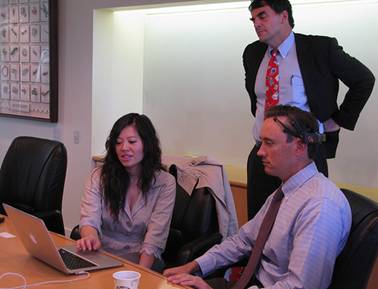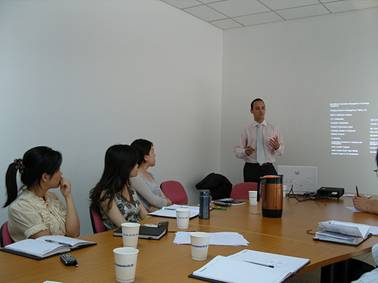Special Topic: Finding and Keeping Jobs in China
If you have been reading my columns over the past few weeks you may be feeling just a little depressed. I am sure it seems that with every column I am bringing a fresh tale of woe from the Chinese workplace. Thus far, I have described companies slashing salaries, trimming headcount and freezing recruitment. I have even detailed the problems that millions of job-hunting graduates will face this summer. Sadly, all of this makes for a pretty accurate description of the employment market in China today.
Because of this, employee morale in many companies is likely to be at a very low ebb. HR departments across the country now face the problem of keeping employees - who may well be feeling insecure and overtly dispensable - happy. This is no easy task. A year ago, if such problems arose, they were easily fixed with either an increase in salary or an expensive teambuilding event. Now, though, the coffers are bare and such solutions are mere pipe-dreams. Instead of offering tangible benefits, HR professionals need to come up with a few more innovative ideas

Photo: jurvetson
Clear Direction
Hewitt Associates 'Best Employer' survey made similar points. It acknowledged that many organizations are being forced to make cuts, but that this need not make employees feel insecure. In fact, one of its key findings was the organizations at the top of the list were those that communicated with employees giving them a clear direction and an added sense of security. Jenny Li, Managing Director of Hewitt Associates Greater China, said, "In times of uncertainty and change, it is crucial to have a clear sense of direction.”
Li’s sentiments were reminiscent of countless nervous employees who were recently interviewed for an online survey organized by the website Taidu.8.com. The majority of who showed that insecurities about their organization’s direction and their own future could affect morale and destroy productivity. For example, one female office worker was quoted as saying, "Nobody knows what the boss really thinks; the bomb could explode on anybody before the cuts are finished.” Another added, “I cannot fully concentrate on work though I force myself at my desk. I cannot help trying to overhear everything happening in the office.”

Photo: rutlo
It is telling that two of the companies on the list, McDonalds and Johnson & Johnson (ranked 3rd and 5th respectively), have been particularly vocal in announcing plans for 2009 and beyond. For example, two weeks ago I discussed McDonalds’ plans to hire new employees and to invest heavily in training and development across Mainland China. Similarly, I also mentioned Xie Wenjinan’s (China CEO of Johnson & Johnson) plans to actively recruit talented employees who may be feeling undervalued or insecure at other organizations. Such strength and direction helps employees feel safe in their role and gives them confidence in their employer.
Organizational Culture
A second major issue in boosting morale – and consequently productivity – is creating a strong corporate culture. Li again emphasized this point before the release of the Hewitt survey. She explained, “Culture has a bigger impact on organizational efficiency than most might care to think. The results point out that The Best (Companies found at the top end of the Hewitt survey) have lower levels of 'entropy' than The Rest (Companies at the bottom), meaning that employees in The Best consume less energy in unproductive work and are able to give more back to the organization. And this, at the end of the day, is a win-win situation for both employees and the company.”

Photo: Cory M. Grenier
Top of the Hewitt list were software experts SAS, who were lauded for their exceptional corporate culture. In a statement issued after the results of the awards were announced, SAS commented, “The award reinforces the business value of SAS’ corporate culture, which has always placed the employee as a top priority. Among the hallmarks of SAS’ workplace environment are consideration for employees’ personal feelings about their work, support for employee development, consistent communications to ensure understanding and alignment with strategic objectives.” It added, “For decades, SAS’ corporate brand has been marked by the company’s commitment to building a balance between work and life. For 12 consecutive years, SAS has been among FORTUNE magazine’s 100 Best Companies to Work For. “Enjoy Work, Fulfill Life” is the motto of SAS Greater China, meaning that creative employees are more satisfied both in the workplace and in personal life.”
The examples listed above – SAS, McDonalds and Johnson & Johnson – are showing that even if they cannot offer high salaries and glitzy benefits, HR can impact upon organizational performance in a positive way. In such turbulent times, this is a massive advantage.
Special Topic: Finding and Keeping Jobs in China
***
Related Links
Salary and Bonuses on the Slide
Training Changes Track
Gloomy Outlook for Class of 2009
Warning’╝ÜThe use of any news and articles published on eChinacities.com without written permission from eChinacities.com constitutes copyright infringement, and legal action can be taken.
All comments are subject to moderation by eChinacities.com staff. Because we wish to encourage healthy and productive dialogue we ask that all comments remain polite, free of profanity or name calling, and relevant to the original post and subsequent discussion. Comments will not be deleted because of the viewpoints they express, only if the mode of expression itself is inappropriate.
Please login to add a comment. Click here to login immediately.